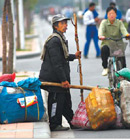-
-
China Daily E-paper
Zhu Qiwen
The domestic call for rebalancing growth
By Zhu Qiwen (China Daily)
Updated: 2010-01-25 06:56
 |
Large Medium Small |
The rebound of the Chinese economy will boost hopes of a steady revival in the global economy this year.
With the world's third largest economy expanding 8.7 percent last year, it seems like this is a good time to breath a sigh of relief. So far, the worst global recession in decades hasn't been as debilitating as most were afraid it would be.
But if the warnings are true that global growth may still weaken in the second half of this year, Chinese policymakers should waste no time in addressing the country's excessive dependency on investment and export for growth.
Rebalancing growth is not simply the theme of joint efforts between China and the international community to reshape the world economic order.
More importantly, the central government is urgently asked to fix the lopsided domestic growth pattern, which is closely related to the growing income gap in this country.
Many of the growth figures that China announced last week are so encouraging that some people have even begun to worry if the economy is growing too quickly.
The return of double-digit growth in the fourth quarter of 2009 speaks volumes for the resilience of this developing economy that has grown by an annual average of 9.8 percent over the past three decades. It shows that the ongoing global recession has not taken a big bite out of the country's long-term growth trend.
Particularly robust is investment growth. Out of a GDP worth 33.5 trillion yuan, the country's fixed asset investment skyrocketed by more than 30 percent year-on-year to 22.5 trillion yuan last year. That surely gives much credence to the argument that the country has practically spent its way out of the latest economic slowdown.
Domestic spending is also fairly strong with the help of a slew of pro-consumption policies. Retail sales grew by 16.9 percent last year, 2.1 percentage points higher than the previous year. The rise in retail sales was the largest in over two decades.
At the beginning of last year, Chinese exporters experienced a hiccup in trying to become one of the long-term growth engines for the Chinese economy as overseas demand dropped. But they have survived and are pushing the country as the top exporter in the world. After falling for months, Chinese exports grew 17 percent in December compared to the year before.
All these growth figures point to a much brighter growth outlook. But a closer look at the income statistics doesn't offer a lot of comfort for Chinese policymakers keen on solving the underlying structural problems of the economy.
According to official statistics, the huge income gap between urban and rural residents unfortunately grew wider last year. While urban residents who earn more than three folds of their rural cousins made a 9.8-percent increase in per capita disposable income, Chinese farmers' net income increased by only 8.5 percent.
Both high single-digit income growth should have been more than welcome in a year dubbed as the most difficult in the new century. Yet, that slight difference in income growth rate is big enough to make the economy to slip further in the direction of unsustainable growth based on a huge domestic income gap.
In theory, it has become clear that the global imbalance, for which China has been blamed to a certain degree, has one of its origins in the country's domestic imbalance of too much investment and insufficient consumption.
China's development stage of fast urbanization and industrialization does make a good argument for high investment ratio to the GDP. But it is undeniable that the widening income gap has further depressed domestic consumption to postpone consumer-led growth.
Rebalancing the Chinese economy away from excess investment and export for growth require Chinese policymakers to focus more on fostering a larger consumer group with adequate buying power.
If so, the widening income gap only makes it more urgent than ever to press ahead with China's rebalancing of its domestic economy.
E-mail: zhuqiwen@chinadaily.com.cn
(China Daily 01/25/2010 page8)









